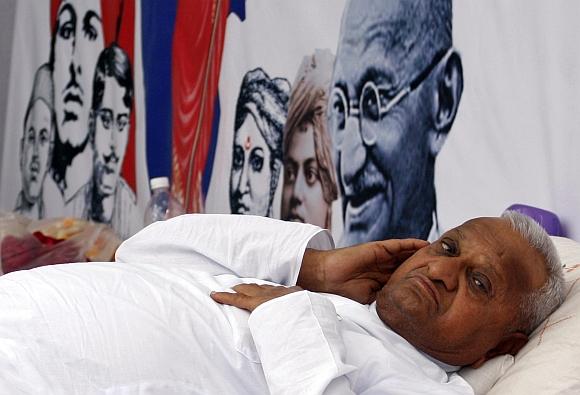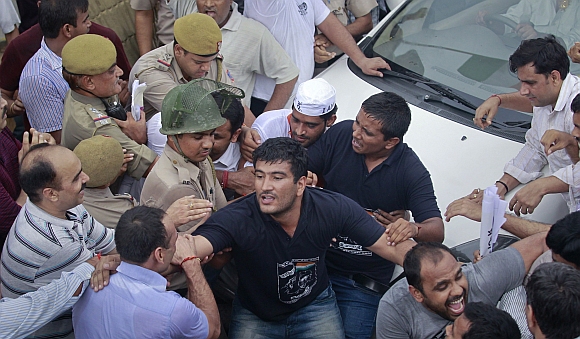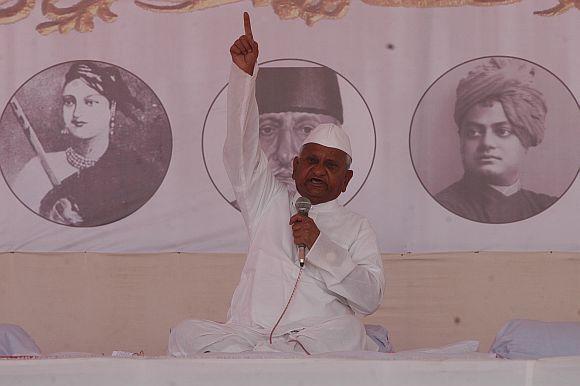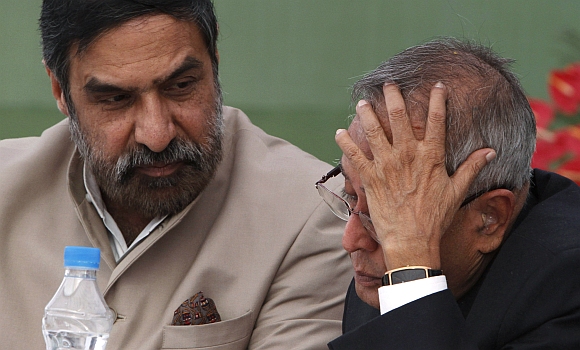
A K Bhattacharya wonders if Kisan Baburao Hazare got his timing wrong, or is Finance Minister Pranab Mukherjee trying hard to get his timing right?
There is nothing common between the two: one is a civil society activist leading a movement against corruption and the other is tasked with the onerous responsibility of reducing both fiscal and current account deficits and getting growth back on track.
Yet, the two must be mulling the importance of timing in everything they have been trying to do in recent weeks.
Take a look at Hazare. He got his timing just right, on the first two occasions he decided to go on a fast in 2011. The first one at New Delhi's Jantar Mantar began soon after the conclusion of a busy cricket calendar, with the Indian team lifting the World Cup at Mumbai's Wankhede stadium on April 2.
...

The fourth edition of the India Premier League was scheduled to start on April 8. Hazare began his fast on April 5 and ended it on April 9, when the government issued a notification to set up a committee to draft a Lokpal Bill.
Consider the many advantages. Summer in New Delhi had not yet set in. School examinations had just ended. Television channels were desperate for news, with the Budget already having been passed by Parliament.
The Jantar Mantar show was an unqualified success in drawing the crowd in large numbers.
In August, when Hazare decided to go on a fast for the second time during the year, the government messed it up by trying to arrest him and, thus, transformed him into an instant hero.
Even then, Hazare had got his timing right. It was August and the rains were on their retreat with occasional mild showers. All that Hazare had wanted then was a commitment from the government that a strong Lok Pal Bill would be introduced in Parliament.
The government bowed to that pressure, all parliamentarians adopted a resolution on this issue and on the 13th day, Hazare called off his fast.
...

But Hazare got his timing completely wrong when he planned his fast for the third time in the year. Or did the government outsmart him? His first big mistake, of course, was to shift the venue of his fast to Mumbai. If proof was needed of Mumbai having no stomach for sustaining and tolerating a political agitation, Hazare's fast provided it rather well.
The three-day fast from December 27 at the MMRDA ground in Mumbai was planned in keeping with the government's parliamentary agenda. The winter session of Parliament was scheduled to end on December 23 and Hazare decided to start his agitation in Mumbai, four days later.
At this point, Hazare's luck also seemed to have run out, as his plea with the court for concessional charges for taking the Mumbai ground on rent was turned down. The government also extended the term of the winter session of Parliament by three days to complete the discussion on the Lokpal Bill.
Predictably, Hazare's fast in Mumbai evoked a lukewarm response from people. His health also deteriorated and he called off his fast on the second day, that is, December 28, when the Lok Sabha also passed the Lokpal Bill, with several amendments, but barring the one that would have given the proposed ombudsman a constitutional status.
The following day, our parliamentarians in Rajya Sabha went back to their old ways and succeeded in postponing the passing of the Bill to the next session.
If Hazare had anticipated the three-day extension of the winter session of Parliament, chosen to hold his fast in New Delhi and planned to start the fast from December 30 instead, who knows the man from Ralegan Siddhi would have been a roaring success even in his third attempt at a hunger strike.
New Delhi's schools would have closed by then and the holiday mood would have ensured that Hazare at the Ramlila ground had company. It was perhaps all a matter of good timing.
...

Finance Minister Pranab Mukherjee also has realised this at great cost. During the just-concluded winter session of Parliament, his government faced two major reverses: both coming from the United Progressive Alliance partner, Trinamool Congress.
First, it was with regard to allowing foreign direct investment in multi-brand retail and then it was the pension reform legislation. Did he underestimate Mamata Banerjee of Trinamool Congress and choose the wrong time for making these big reformist moves?
Did he not realise that Banerjee would extract her pound of flesh seeing the dependence of Congress on her party's support for even a simple majority in the Lok Sabha?
Make no mistake. Mukherjee, too, is now trying to get his timing right. The Lokpal Bill could be back in the Rajya Sabha only after the next round of elections to the Upper House of Parliament, when the Congress may improve its seats strength there.
More significantly, Mukherjee is not likely to present his Budget on the scheduled date of February 29. He will do so after the results of the five-state Assembly elections are out on March 4.
The postponement of the Budget is not so much because of the elections and the code of conduct enforced by the Election Commission. The real reason is that Mukherjee wants to be sure if the election results will give his government a more stable alliance, reducing its critical dependence on Mamata Banerjee.
If that goal is achieved, Mukherjee can go ahead with some big moves in his Budget. Without that, he may well present a different Budget, one with which Banerjee has no problems.
...
Photographs: B Mathur/Reuters